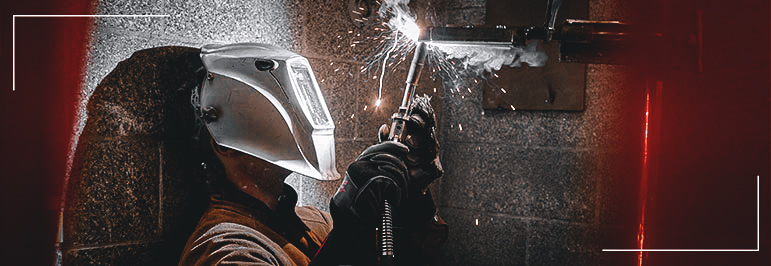Welding and Fabrication

Welding and Fabrication - Basic Welding Skills
Prepare for your welding career through this program. Then put your high-demand skills to work in the metal and construction trades as a welder, cutter, or welding machine operator. Students choose to specialize in one of three areas: aluminum, structural fabrication, or pipe welding. In our state-of-the-art welding and fabrication facility, you’ll learn valuable skills that high-wage employers are looking for. From safety practices and blueprint reading, to technical skills like metallurgy, MIG, and TIG welding, BTC’s hands-on training will prepare you for a career in boat manufacturing, steel manufacturing, refining, and transportation, or with federal, state, or local governments.
Employment Information
Data are provided on a program (not credential) level
93% BTC graduate placement rate1
$48,004 starting annual wage2
$62,677 average annual wage2
$81,243 potential annual wage2
Entry Information
When Can I Start?
This program typically starts in Fall Quarter.
What are the Minimum Entry Requirements?
Admissions application and assessment testing in Reading, Math and Writing is required. Your score on the test and/or your previous transcripts will determine where you begin your course sequence. Contact Admissions at 360.752.8345 or at admissions@btc.edu for assistance with academic planning.
Early Program Course Requirements
It is highly recommended that students take these courses prior to program entry:
- CMST& 210 Interpersonal Communications
- AENGL 100 Applied English
- AMATH 100 Applied Occupational Math
What are My Next Steps?
Classes
Total Program Credits: 55
Total Program Credits: 55
Core Courses for Program
WLD 101 Welding Safety 2 CR WLD 105 Thermal Cutting Processes 4 CR WLD 106 Print Reading I 2 CR WLD 110 SMAW I 4 CR WLD 116 SMAW Practice 2 CR WLD 120 GMAW I 4 CR WLD 121 GMAW Aluminum I 4 CR WLD 130 FCAW I 4 CR WLD 131 FCAW Practice 2 CR WLD 140 GTAW I 4 CR WLD 141 GTAW Aluminum I 4 CR WLD 150 Introduction to Metal Fabricating 4 CR
TOTAL Core Course Credits40 CR General Education Core Courses
AMATH 100 Applied Occupational Math 5 CR AENGL 100 Applied English 5 CR CMST& 210 Interpersonal Communications 5 CR
TOTAL General Education Course Credits15 CR
Program Outcomes
- Exhibit & maintain essential employability behaviors;
- Observe and practice industry safety guidelines;
- Analyze and interpret prints, drawings, and symbols for welding and fabrication of parts and structures;
- Achieve competency in a variety of major manual and semi-automatic welding processes in all positions;
- Demonstrate proper set-up and use of welding and fabricating equipment;
- Troubleshoot and solve basic welding, fabricating and equipment problems;
- Pass at least one WABO certification or industry-accepted certification welding test (ASME, AWS, ABS, etc.);
- Exhibit knowledge of occupational environments, metallurgy, materials, tools, fabrication, layout, and mechanical and thermal cutting processes and techniques;
- Demonstrate appropriate oral and written communication with customers, co-workers, and supervisors;
- Analyze and interpret prints and drawings for welding and fabricating;
- Employ efficient organizational skills;
- Stay current with new and emerging technologies.
Employment Outlook
Employment opportunities for welders are expected to increase. Employment opportunities for welders, cutters, and welding machine operators differ by occupational specialty.
About 83% of BTC Welding students are employed within nine months of graduation. The average annual wage in this field is $48,422, with an earning potential of about $60,195 per year.*
Criminal convictions may restrict or prevent student participation with internships and employment in this industry.
Welders are employed in various areas of business and industry that require working with different types of metal for either manufacturing, repair, or cutting. Nationally, nine out of ten welders and cutters are employed in manufacturing, services, construction, or wholesale trade.
Typical places of employment include sheet metal fabrication companies, energy service companies, steel manufacturing companies, refineries, fence and iron companies, transportation, heating and plumbing companies, various unions, federal, state and municipal government, and self-employment. Potential positions include welder, cutter, welding machine tender, welding machine operator, foreman, and leadman.
Faculty & Support

Russell Jones

Coly Rush

Kyle Miller

Rachael Wright

